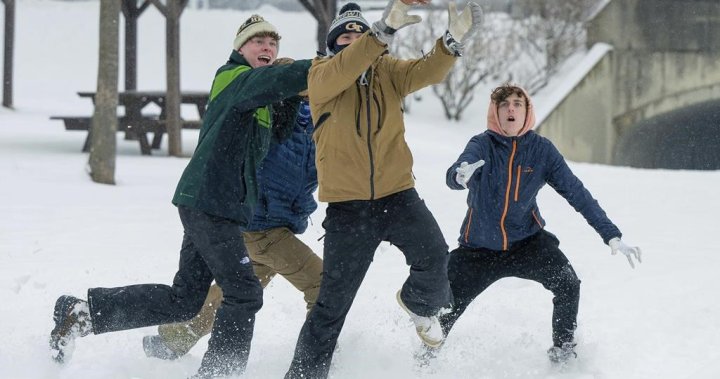Children’s playtime shouldn’t be as safe as possible, doctors say.
Recommendations published Thursday by the Canadian Paediatric Society said “risky play,” defined as any “thrilling and exciting free play … that involves the possibility of physical injury,” can improve physical, mental and social health.
“We now know that children need to experience risk in their life in order to have a normal development,” Dr. Emilie Beaulieu, a pediatrician and the author of the guidelines, told Global News.
The recommendations come amid mixed opinions over a tobogganing ban in Toronto.
Some hills, according to the city, have hazards like trees, rocks and stumps that may make them unsafe for tobogganing.
Speaking from Quebec City, Beaulieu said risky play can include biking at high speed, playing with tools or playing where there is a risk of disappearing, like in a forest.
What constitutes risky play is different for each child and depends on their age, development stage, personality and how confident they are in their skills.
The benefits, Beaulieu said, include kids being more active and having less obesity, lower stress levels and higher self-esteem.

She stressed the play should be risky but not hazardous.
A risk is something that the child will be able to recognize, where they can evaluate the challenge and then decide if they want to undertake the activity, she said.
Get the latest Health IQ news.
Sent to your email, every week.
A hazard is when the potential for injury is beyond the child’s capacity to recognize it.
She said risky play doesn’t mean an adult is absent, as an adult can help spot potential hazards.
“But we should keep all the risks that children are allowed to take.”
Mariana Brussoni, a University of British Columbia professor and developmental psychologist, said risky play is beneficial to “just about every aspect of child development you can think of,” including “the development of risk management skills, also being able to figure out psychologically what you’re most comfortable with.”
She also said it teaches children how to react when something goes wrong and that they can learn they are resilient.

“This kind of play gives kids practice in managing those strong emotions and being able to figure out (whether what they’re experiencing) is a thrill and excitement versus danger and anxiety,” she said, speaking from Vancouver.
She said the need to distinguish “risky play” from what was once known as just “play” (like a proverbial parent sending their kid out of the house and telling them to return when it was dark) rose in the past few decades.
She said economic stratification caused parents to put more pressure on their children – which in turn left less time for free play.
“Around the late 1980s, there was increasing inequities in society that meant that the rich got richer, the poor got poorer, and the gap in between increased,” she said, which put pressure on parents to push their children to have higher grades and more experiences so they could get better education.
She told Global News the result is a society where parents are now responsible for curating their children’s experiences.
“What that’s meant is an eroding of freedom of kids, an eroding of their free time (and) thinking that play is just frivolous,” she said.
Brussoni said parents now also face pressure, and potential shame, if their kid gets hurt.
She stressed risky play helps build capable, competent adults.
“It’s like any muscle,” she said.
“You have to practise these skills and build them so that when you are an independent adult, you actually know what to do.”
— with files from Global News’ Noor Ra’fat Ibrahim
© 2024 Global News, a division of Corus Entertainment Inc.




